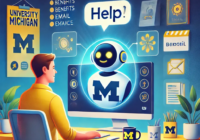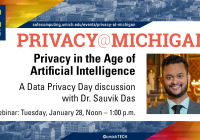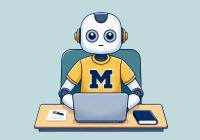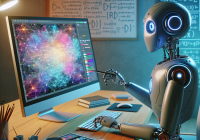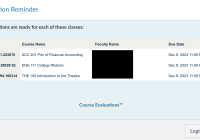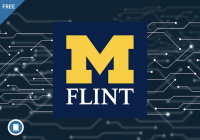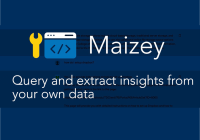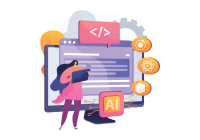Tag Archives: Artificial Intelligence
The Paradox of AI Assistance: Better Results, Worse Thinking
Worshiping at the Altar of AI
Tech Tip: DuckDuckGo AI Chat
Meet OnboardingA2 Maizey: Helping new staff get their bearings at U-M with the help of U-M AI Tools
OpenAI’s o1 and o3-mini reasoning models now available through U-M GPT
Information and Technology Services is pleased to announce the integration of two new models into U-M GPT, the o1 and the o3-mini from OpenAI, which users can now access through the U-M GPT homepage dropdown menu. This update marks the first inclusion of ‘reasoning models’ to U-M’s AI services, which excel in the ability to perform tasks that require multi-step… Read More »
Introducing Go Blue: AI-powered mobile app for the U-M community
Celebrating Data Privacy Day 2025
Data Privacy Day event: Privacy in the Age of AI
Fall 2024 Enhancements to Maizey AI
Earlier this fall, the Emerging Technology team within ITS released several improvements and new features for our custom generative AI tool, Maizey. As the academic year unfolds, these features will help faculty, staff, and students to streamline workflows, create and interact with custom AI tutors, and more.
How to Create Amazing AI Images Using DALL-E 3 in U-M GPT
New Features, Extended Free Usage for U-M AI Services in 2024
Using GenAI to design floor plans and buildings
There is a lot to consider when designing places where humans live and work. How will the space be used? Who’s using the space? What are budget considerations? It is painstaking and time consuming to develop all of those details into something usable. What if Generative AI (GenAI) could help? We already know that it can be used… Read More »
UM-Flint improves course evaluation response rates using ChatGPT
Tech Tip: Bluesky
This month I’m highlighting a decentralized social app called Bluesky. It was developed by former Twitter CEO, Jack Dorsey. It aims to create a new form of social media that is open, transparent, and community-driven. The platform uses an open-source framework and has a Twitter-like user interface with algorithmic choice, federated design, and community-specific moderation. Its goal is… Read More »
Free GenAI prompt literacy course, resources
Nick Gaspar was a member of the Generative AI Advisory (GAIA) Committee that wrote the GenAI report for the university. “During that time I saw a widening gap of knowledge across the university when it came to writing prompts for AI, so I built a free prompt literacy course for the campus community.” AI prompts are text or… Read More »
U-M Maizey AI tool gets new interface, extends no-cost service until 2024
Tech Tip: Arc Max
This month, I’m highlighting some new, innovative AI features that were recently added to the already impressive Arc web browser: Arc Max. Rather than simply adding a sidebar for ChatGPT like many other browsers are doing, they identified five specific integrations that can make browsing the web easier and more enjoyable: Each of them may be individually enabled… Read More »
Tech Tip: Upscayl
This month’s tip is an AI tool for upscaling low-quality images with surprisingly good accuracy and detail: Upscayl. It’s an excellent app for those looking to enhance the quality of their photos, especially those taken with older digital cameras. Multiple settings are available, like selecting the type of image, how much to upscale, file type, and advanced users… Read More »
Getting started with generative artificial intelligence: U-M Instructor Guide
The U-M Teaching and Technology Collaborative (TTC) is excited to share the official Getting Started with Generative Artificial Intelligence: U-M Instructor Guide with campus. The guide is differentiated, portable, and easy-to-use. It reflects the variety of new GenAI resources available, ranging from custom U-M AI tools, GenAI workshops, and a new U-M GenAI website.




